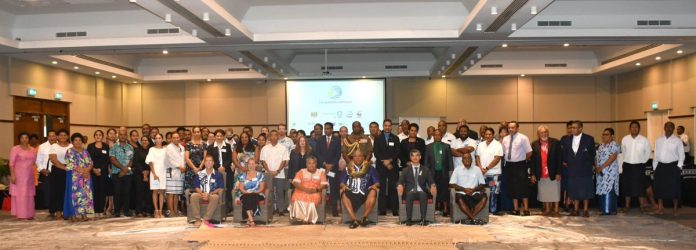By Samisoni Pareti
Dialogue is key to ensuring the durability and sustainability of marine conservation parks, was the consensus of a panel of experts at the second day of the Fiji Seascape Symposium.
Providing space for civic actors to meet and talk with their partners in government has worked in the past, said Alifereti Tawake, head of the Pacific’s Locally Marine Management Areas (LMMA). This was important, he said, because managing seascapes “should be everyone’s business”.
Tawake added it would work only through the sum of individual effort, or the sum of individual qoliqoli (communal fishing effort), and that while it is true that government has a key role to play in ocean management, everyone including local communities needed to play their part too. Tawake said dialogue and talanoa fit well into the call by Permanent Secretary for Fisheries and Forestry, Pene Baleinabuli for ‘open dialogue’ between government and NGOs who work in the ocean conservation space.
The theme of collaboration and dialogue was also stressed by Ambassador Solo Mara in his intervention, who believes this is the best way of bridging the government/civil society divide. While widely used as the way forward, dialogue, Ambassador Mara said, tended to be used merely as a ‘ticking the box’ gesture. Participants needed to dialogue with “bags of goodwill”, and such goodwill promotes solution seeking and flexibility to compromise. Such an approach, he said, was the principle behind the formation of the Pacific Islands Development Forum of which he currently heads as its Secretary General.
Ambassador Mara said PIDF’s key partners are governments, CSOs and the private sector, and while these are not “natural bedfellows,” dialogue was the gel that made PIDF work. No one party has the monopoly on solutions, which is why dialogue is the way to go, he said. Ambassador Mara also spoke about the need to sometimes “take the gloves off and speak plainly. “This is imperative to iron over disconnect that exist in the environmental conservation space. Making the commercial service provider a regulator is part of this disconnect as well as “middle managers” who tend to create “unnecessary sensitivities.”
Permanent Secretary of Fisheries, Pene Baleinabuli spoke of the ministry of fisheries’ proposal to reopen Fiji’s beche-de-mer fishery, after a ban on the harvest of the seafood delicacy was enforced in 2017. The ban is still in force, because Cabinet has yet to decide on the ministry’s recommendation to have it lifted. Of Fiji’s 14 provinces, 11 want beche-de-mer fishing to be fully opened, while the remaining three provinces preferred 80%. The ministry is also recommending that Underwater Breathing Apparatus (UBA) be banned because of the serious injuries and fatalities the equipment had inflicted on users. Harvest quotas are being proposed as well, and resource owners will also be encouraged to be ‘active participants’ in the fishery by applying for licences to harvest, as well as active players in the value-adding chain of processing and exports. A BDM that is sold here for FJD$50 (US$25), if processed correctly, could fetch as high as USD$1,000 in the international market, he said.
How national policy can improve and contribute to good enabling conditions for seascape management was the focus of WWF senior adviser, Alfred Atalifo’s contribution. He said Tonga is a success story in this regard, with its Tonga Ocean 7 initiative, brought into force through the kingdom’s Marine Spatial Act of 2012. Ocean 7 refers to the seven government ministries that work together in ocean conservation and management strategies, encompassing consultation and engagement with all players including local communities, the private sector and consumers. Dialogue is a key word and conflict reduction encouraged. Atalifo believes Fiji has so much to learn from its immediate western neighbour because marine spatial legislation guides work for activities both inside and outside designated seascapes or marine protected areas.
Panellist and acting Director of the Institute of Applied Science at the University of the South Pacific, Dr Isoa Korovulavula, raised the subject of formal and informal learning in the development of seascape leaders. Dr Isoa said while formal learning is offered at the University’s School of Agriculture, Geography, Environment, Ocean and Natural Sciences, as well as its Pacific Centre for Environment and Sustainable Development, future leaders can also be groomed in informal and vocational programmes that institutes like the one he manages offer. In this regard, USP’s IAP has been involved in community-based learning. Dr Korovulavula gave the examples of the community-based biology monitoring training it offered marine resource owners, as well as training on natural resource governance. The governance training was held with the support of the Fijian Ministry of iTaukei Affairs and offered to traditional leaders, first piloted with the nine high chiefs of Kadavu province in southern Fiji.
Legislation is high on Dr Stacy Jupiter’s list of of enablers for ocean conservation management to work. She is director of Wildlife Conservation Society Pacific, and acting head of the WCS Fiji office. Financial systems and support is also key, and among viable options are trust funds, deeds of trust, corporation acts, as well as public statutory agencies and government ministries. Legislation can also house financial models as is the case with Australia’s Great Barrier Reef, or a revolving fund like the blue bond option.
Fiji’s first ever Seascape Symposium continues at the Grand Pacific Hotel in the capital Suva, and ends today.
SOURCE: ISLANDS BUSINESS/PACNEWS













